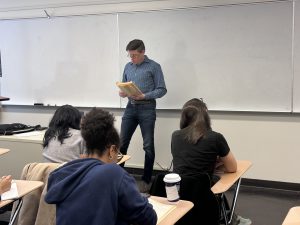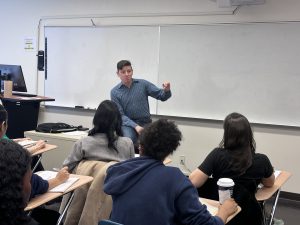
An early afternoon hush settles over the classroom as students shuffle in, textbooks thudding onto desks and earbuds disappearing into backpacks. The mood is part dread, part ritual — quiz day in Intensive Intermediate French. At the front of the room stands Professor Desmond Hosford, crisp in a tailored shirt and jeans, surveying the room with the calm intensity of someone who has done this hundreds of times. He doesn’t need to raise his voice; the energy shifts as soon as he speaks.
The quiz ends. The students hand in their quizzes and turn their attention to the projector. Suddenly, the room feels more like a theater than a classroom. A scene from French in Action, a vintage language series and the textbook Hosford uses, flickers onto the screen. Characters speak in rapid, colloquial French, their Parisian accents rolling. Hosford is alive now—echoing the lines, pointing out grammar in real time, and jumping between English and French with a fluidity that feels more like performance than instruction.
“French is a fussy language,” Hosford later explains. “The hardest of the Romance languages to pronounce. Some of the sounds just don’t exist in English — you have to exaggerate. You have to perform.”
Performance is at the heart of Desmond Hosford’s teaching style. Whether he’s mimicking the distinct vowel sounds of northern France or encouraging students to fully immerse themselves in a new verb—by writing it out, saying it aloud, and visualizing the words in a cartoon bubble above their heads—Hosford believes language learning is most effective when it’s active and engaging. “Culture is what makes language stick,” he explains. “If you’re emotionally connected, you’ll remember it.”
Of course, not everyone walks into his class ready to perform. Many Hunter College students are there to fulfill a language requirement, and Hosford knows the uphill climb he’s against. “Some of them don’t even know basic English grammar,” he says. “You can’t learn a pluperfect in French if you don’t know what it is in English.” But his philosophy is simple: meet students where they are and push them forward, even when they don’t believe in themselves.
“What I enjoy most,” he says, “is when a student who’s been struggling all semester comes to me and says, ‘Thank you for believing in me.’ They think they’re going to fail — and then they don’t. Not because I inflated their grade, but because they did the work. They earned it. I get to say, ‘I told you so.’ And the confidence they gain? That’s everything.”
Hosford lights up when he talks about these breakthrough moments — when something finally clicks. “We’ll be going over this tough concept, and someone’s just not getting it — and then suddenly, they do. Then everyone starts doing these complicated things they didn’t think they could do, and I’m bouncing off the walls. I tell them, ‘You don’t even know what you just did. You crushed it. Pat yourself on the back. Yay, you.”

But language learning in 2025 isn’t what it was two decades ago, and Hosford has seen the shift firsthand. “My book isn’t online,” he says. “You can read it on your iPad, fine. But now that so much coursework is through these online platforms, students don’t write anymore — they type. They get three tries to guess the answer. It’s not the same as writing it out, getting it wrong, and having to talk through why.”
He believes the new systems, while convenient, often oversimplify the process. “It becomes like a video game. But language isn’t a game. If you don’t write it by hand, it doesn’t stick. Your brain doesn’t make the same connections.”
That’s not the only tech trend he pushes back against. He warns students to avoid language-learning apps like Babbel and Duolingo, criticizing their oversimplified instruction and grammar errors. “There’s an ad for Babbel where someone says j’aimerais un taxi — that’s literally the wrong verb. It should be je voudrais. A one-on-one mistake. And they paid real money for that campaign!”
His message to students is consistent: Don’t rely on Google Translate, apps, or AI.
“I had a student who was obsessed with ChatGPT — using it for everything,” he says. “I told him no. Absolutely not. Before, the problem was Google Translate. Now it’s this. AI can’t teach you a language. It can’t capture nuance. And it’s taking jobs from real people. Editors, teachers — we’re being replaced by something that can’t do what we do.”
Despite his critiques of the digital age, Hosford doesn’t seem unreasonable. He’s passionate, expressive, and deeply committed to his students’ success. His classroom is a space of energy, challenge, and transformation.
Even if his students don’t walk away fluent, they walk away having done something hard — and done it well.
“Maybe you’re not a French major. Maybe you’ll never use this again,” he tells them. “But you did this. And you should be proud.”
His students recognize that passion and drive. Brianna Marthel, a senior, shares, “Professor Hosford is a great teacher. He’s very passionate about what he does. He’s a little dictation-heavy but really cares about the students’ learning.”
Liana Chirila adds, “Professor Hosford is full of zest when he teaches. He’s immersed in what he’s teaching, making you want to learn more.”
For Hosford, the real reward is the transformation he sees in his students — the quiet victories, the moments of realization when a student who struggles walks away knowing they’ve conquered something difficult. That’s what keeps him teaching year after year.
